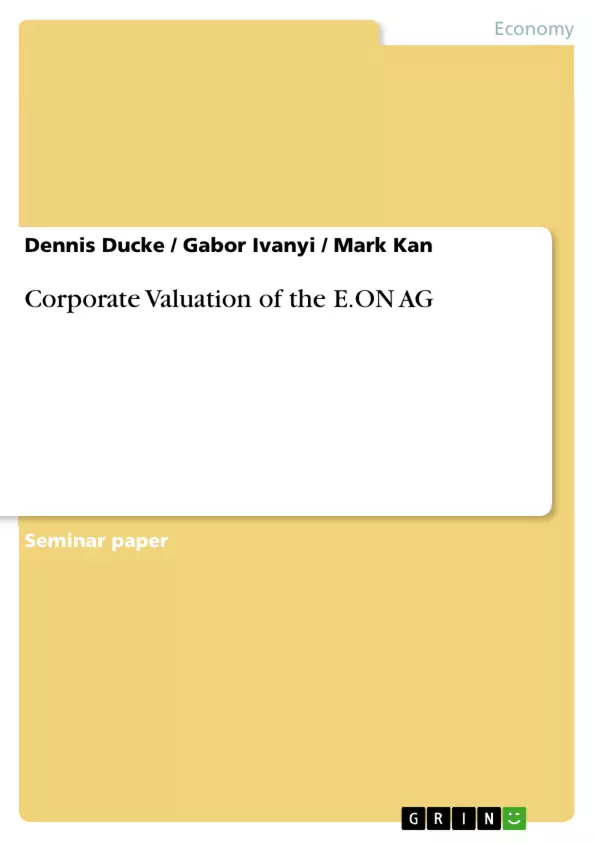The main scope of this assignment is the valuation of the E.ON AG – a German based
energy corporation, with about 88.000 employees and annual sales of about 69 billion
Euros. It is one of the world’s largest investor-owned energy service firms. The core
activities of E.ON are the generation, transmission and distribution of electricity as well
as the transmission, storage and sale of natural gas.
For the corporate evaluation of E.ON, the editor based his calculation on the two most
common global evaluation approaches – the discounted cash flow (DCF) and the
multiplier method. The DCF method estimates the value of a company by discounting
expected cash flows in the future or determined period of time, similar to the value of an
investment. For the assessment of the company value, the entity and equity DCF
method with an assumed constant growth rate between 1.5 and 3 percent, have been
utilized.
For the validation of the calculated DCF corporate values the multiplier method was
executed as second evaluation method based on Price-Earnings, Price-Book value and
Price-Turnover ratios. For the necessary peer-group, the authors selected the other three
big players RWE, EnBW and Vattenfall, which form an oligopoly market in Germany.
Including E.ON they own more than 70 percent of German energy infrastructure and
have a market share of about 95 percent.
The calculation of the different entity and equity based discounted cash flows and P/E,
P/B and P/T ratios resulted in a wide range of corporate values between 73 billion and
146 billion Euros.
Finally, the average corporate value of the E.ON AG was determined at approximately
109 billion Euros.
Inhaltsverzeichnis (Table of Contents)
- EXECUTIVE SUMMARY
- TABLE OF CONTENTS
- LIST OF ABBREVIATIONS
- LIST OF FIGURES
- LIST OF TABLES
- INTRODUCTION
- PROBLEM DEFINITION
- OBJECTIVE
- METHODOLOGY
- METHODS OF CORPORATE VALUATION
- Overview
- Separate Valuation Methods
- Reproduction Value Method
- Liquidation Value Method
- Mixed/Relative Valuation Methods
- Real Options Method
- Market Multiplier Method
- Global Valuation Method
- Discounted Cash Flow Method
- Entity Approach
- Equity Approach
- Adjusted Present Value Method
- Earnings Value Method
- COMPANY PROFILE OF E.ON AG
- Overview
- Financials
- Sales and revenues
- Employment situation
- Stock development
- Sector analysis and competitors
- CORPORATE VALUATION OF THE E.ON AG
- Assumptions for the corporate valuation
- DCF-Entity
- DCF-Equity
- Multiplier Method
- Peer-group composition
- Definition of multipliers
- Multiplier aggregation over peer group
- Summary of evaluation results
- CONCLUSION
- BIBLIOGRAPHY
- ITM-CHECKLIST
Zielsetzung und Themenschwerpunkte (Objectives and Key Themes)
This assignment aims to evaluate the E.ON AG, a prominent German energy corporation. The authors employed two widely recognized valuation methods: the discounted cash flow (DCF) approach and the multiplier method. The DCF method calculates the company's worth by discounting future cash flows. The multiplier method relies on comparable companies to derive a value for E.ON. The analysis aims to determine a comprehensive valuation of E.ON AG.
- Corporate valuation methodologies
- Discounted cash flow (DCF) method
- Multiplier method
- E.ON AG's financial performance and market position
- Comparison to industry peers
Zusammenfassung der Kapitel (Chapter Summaries)
The introduction provides a brief overview of the assignment's scope, focusing on the valuation of E.ON AG, a leading German energy company. The problem definition clarifies the need for a comprehensive valuation of E.ON, highlighting its importance in the energy sector. The objective outlines the goal of determining the corporate value of E.ON using established valuation methods. The methodology section delves into the various approaches for corporate valuation, exploring both separate and global valuation methods. The discounted cash flow (DCF) method, as a global valuation method, is presented with its two approaches: entity and equity. The chapter also discusses the adjusted present value method and the earnings value method. The chapter dedicated to E.ON AG's company profile provides an overview of the company's operations, financials, including sales, employment, and stock development, as well as a sector analysis and a comparison with competitors. This chapter lays the foundation for the subsequent corporate valuation. The corporate valuation section discusses the assumptions used for the valuation and the implementation of both the DCF approach (entity and equity) and the multiplier method. It examines the peer group composition, the definition of multipliers, and the aggregation of multipliers across the peer group. The summary of evaluation results highlights the range of corporate values derived from the different approaches used.
Schlüsselwörter (Keywords)
The key terms and concepts in this assignment are: corporate valuation, discounted cash flow (DCF), multiplier method, entity and equity approaches, E.ON AG, German energy sector, industry peers, financial performance, stock development, and corporate value.
Frequently Asked Questions
Which methods were used for the corporate valuation of E.ON AG?
The valuation was based on the Discounted Cash Flow (DCF) method (entity and equity approaches) and the Multiplier method.
What was the determined average value of E.ON AG?
The average corporate value was determined to be approximately 109 billion Euros.
Who are the main competitors included in the peer group analysis?
The peer group consisted of the other "big players" in the German energy market: RWE, EnBW, and Vattenfall.
What are the core activities of E.ON?
E.ON focuses on the generation, transmission, and distribution of electricity, as well as the storage and sale of natural gas.
Which ratios were used in the Multiplier method?
The authors used Price-Earnings (P/E), Price-Book value (P/B), and Price-Turnover (P/T) ratios for the validation.
- Quote paper
- Dennis Ducke (Author), Gabor Ivanyi (Author), Mark Kan (Author), 2008, Corporate Valuation of the E.ON AG, Munich, GRIN Verlag, https://www.grin.com/document/141911



